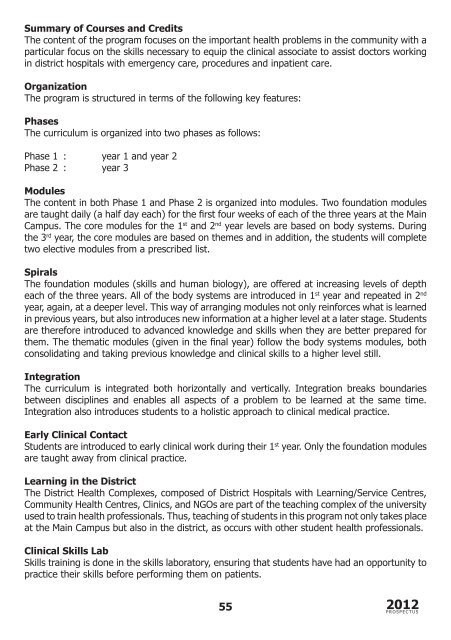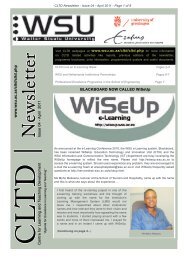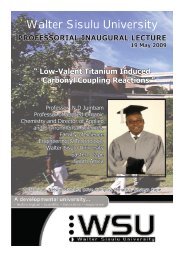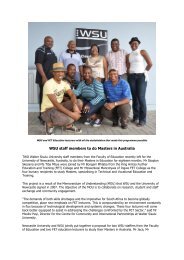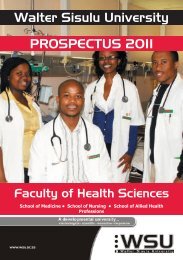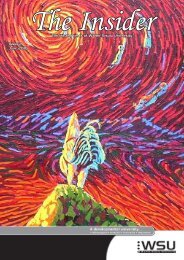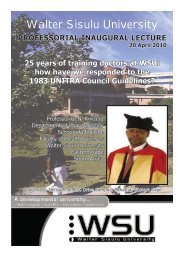Faculty Prospectus 2012 - Walter Sisulu University
Faculty Prospectus 2012 - Walter Sisulu University
Faculty Prospectus 2012 - Walter Sisulu University
You also want an ePaper? Increase the reach of your titles
YUMPU automatically turns print PDFs into web optimized ePapers that Google loves.
Summary of Courses and Credits<br />
The content of the program focuses on the important health problems in the community with a<br />
particular focus on the skills necessary to equip the clinical associate to assist doctors working<br />
in district hospitals with emergency care, procedures and inpatient care.<br />
Organization<br />
The program is structured in terms of the following key features:<br />
Phases<br />
The curriculum is organized into two phases as follows:<br />
Phase 1 : year 1 and year 2<br />
Phase 2 : year 3<br />
Modules<br />
The content in both Phase 1 and Phase 2 is organized into modules. Two foundation modules<br />
are taught daily (a half day each) for the first four weeks of each of the three years at the Main<br />
Campus. The core modules for the 1 st and 2 nd year levels are based on body systems. During<br />
the 3 rd year, the core modules are based on themes and in addition, the students will complete<br />
two elective modules from a prescribed list.<br />
Spirals<br />
The foundation modules (skills and human biology), are offered at increasing levels of depth<br />
each of the three years. All of the body systems are introduced in 1 st year and repeated in 2 nd<br />
year, again, at a deeper level. This way of arranging modules not only reinforces what is learned<br />
in previous years, but also introduces new information at a higher level at a later stage. Students<br />
are therefore introduced to advanced knowledge and skills when they are better prepared for<br />
them. The thematic modules (given in the final year) follow the body systems modules, both<br />
consolidating and taking previous knowledge and clinical skills to a higher level still.<br />
Integration<br />
The curriculum is integrated both horizontally and vertically. Integration breaks boundaries<br />
between disciplines and enables all aspects of a problem to be learned at the same time.<br />
Integration also introduces students to a holistic approach to clinical medical practice.<br />
Early Clinical Contact<br />
Students are introduced to early clinical work during their 1 st year. Only the foundation modules<br />
are taught away from clinical practice.<br />
Learning in the District<br />
The District Health Complexes, composed of District Hospitals with Learning/Service Centres,<br />
Community Health Centres, Clinics, and NGOs are part of the teaching complex of the university<br />
used to train health professionals. Thus, teaching of students in this program not only takes place<br />
at the Main Campus but also in the district, as occurs with other student health professionals.<br />
Clinical Skills Lab<br />
Skills training is done in the skills laboratory, ensuring that students have had an opportunity to<br />
practice their skills before performing them on patients.<br />
55<br />
<strong>2012</strong><br />
PROSPECTUS


